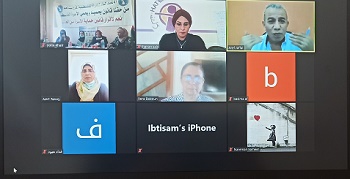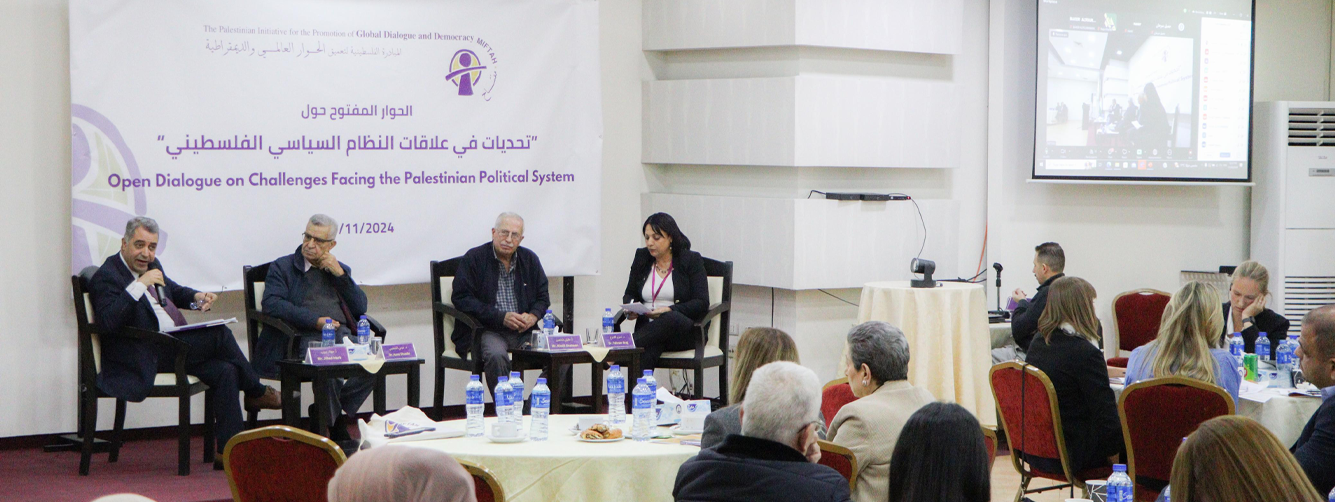
Ramallah – 5/11/2020 ¬ MIFTAH recently capped off a series of dialogue sessions in various parts of the West Bank and Gaza Strip, which revolved around the gaps in the Palestinian electoral system. The participants discussed means of electoral reform for Palestinian general and legislative elections with participation from the various social sectors, including women and youth, civil society and Palestinian factions and parties.
During the sessions, a MIFTAH factsheet on the political participation of women and youth in Palestine was discussed, particularly regarding their representation in election laws, both local and general. It included proposed recommendations supporting an increase in women and youth representation in the electoral process as part of the required efforts from official and unofficial institutions to make the necessary amendments to the electoral systems (local and general) in a way that promotes democracy, civic peace and justice for all social sectors.
The factsheet addressed the most important demands pertaining to electoral reform, vis-à-vis the first general elections in 1996 in addition to electoral reform at the local council level. The demands reaffirmed the issue of elections administration represented by the CEC (Central Elections Commission), most significantly the continuation of its work as an independent, neutral and honest commission. There were also demands regarding the basis of the electoral system, which is that the majority system does not afford justice between the candidates, nor does it fairly reflect representation of the social sectors. Some of the reform demands addressed the technical and representative aspects of elections, which were reflected in civil society campaigns, including the demand by women’s institutions for an increased women’s quota and guaranteed seats for these women. Youth also contributed to the demands including lowering the candidacy age in order to increase youth representation in elected national institutions.
Recommendations
The factsheet included a number of recommendations for the next general elections, calling for the proportional representation system and for the homeland to be considered as one constituency at the adopted threshold of 1.5%. It said this was the best means of ending the division, which has been ongoing since 2007.
The participants also demanded that the quota system is increased in line with the Central Council decision, to a 30% minimum, which would require a change in electoral list rankings. In order to reach the required percentage in the results, the provision in the law must be as follows: one woman among the first two names on the list then one woman among every three names along with the application of the 30% women’s quota. This would increase women’s participation to 40 of 132 seats in the PLC. Another demand was to lift the restriction on the age of candidacy, putting it at 18. It would also create a system of incentives for lists that placed youths as one of the first three names on its list and then one of every four names.
Meanwhile, the recommendations regarding local elections included: rejection of the Ministry of Local Government recommendation to adopt open lists given that this would decrease chances for alliances and would directly impact the status of women and youth in local councils, not just in terms of numbers but also because it is unfair if it is left to the voters to vote for one name on the list.
The recommendations also rejected the proposal to exclude women’s representation of 30% in municipalities categorized as A and B and depriving them of being represented with the same percentage in councils categorized as C, which are more in number. Instead, they proposed numbers and percentages that coincide with the categorization of the councils and the number of members in each one.
In terms of youth, participants also rejected the proposal of the ministry to adopt the candidacy age of 23. Instead they focused on lowering the candidacy age to 18, which is the age for voting. Other recommendations included: offering incentives for lists that include guaranteed seats for youth such as one among the first three names; empowering young people with knowledge of electoral laws and mechanisms for forming lists and ranking among candidates so they can choose places that would enable them to be represented instead of just endorsing their lists; lowering the threshold to 5% or cancelling it altogether; lowering the minimum number for lists to three candidates, which would help women and youth to easily form their lists, with emphasis on commitment to periodical elections every four years.
These discussion sessions are held within MIFTAH’s “Policy, Dialogue and Good Governance” program, which is aimed at promoting women and youth participation in formulating public policies and involvement in the management of public affairs by advancing their representation in decision-making circles in the Palestinian political system. The sessions were held with support from the Norwegian Representative Office.








